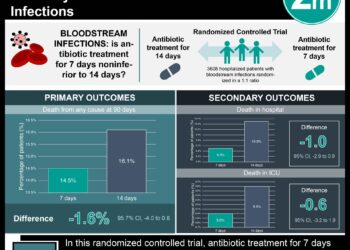Risk stratification criteria demonstrate high sensitivity for invasive bacterial infections among febrile infants
1. The Rochester criteria and the modified Philadelphia criteria were found to have the same sensitivity (greater than 80%) in identifying infants 29-60 days of age at high-risk of having an invasive bacterial infection (IBI).
2. The Rochester criteria had lower sensitivity among infants ≤28 days of age compared with the modified Philadelphia criteria.
Evidence Rating Level: 3 (Average)
Study Rundown: The Rochester and modified Philadelphia criteria, both developed over 20 years ago, are 2 widely employed decision making tools used to stratify febrile infants ≤60 days of age, based on risk of serious bacterial infection (SBI). While the literature shows about 10% of infants in this age group who present to the emergency department (ED) with fever are found to have a SBI, a minority of these patients had an IBI (e.g. bacteremia and/or bacterial meningitis). Authors of this study aimed to evaluate the precision of the Rochester and modified Philadelphia criteria in risk stratifying infants ≤60 days of age with IBI who were seen in the ED. Of note, neither of these criteria sets include CSF analysis in their criteria. Results showed the sensitivity of the modified Philadelphia criteria was higher but the specificity was lower than that of the Rochester criteria. While the modified Philadelphia criteria automatically classifies all infants ≤28 days of age as high-risk, the Rochester criteria does not and mistakenly classified 2 infants ≤28 days of age with IBI as low-risk. The sensitivity of both criteria sets were the same when looking at only those infants between 29-60 days of age. This study is limited by retrospective data collection from medical records, therefore infants with IBI who were missing variables of either criteria set were excluded from the analysis. These findings suggest that most febrile infants aged 29-60 days classified as low-risk according to the either criteria set can be safely discharged from the ED without CSF testing, however these patients should have close outpatient monitoring after discharge. Greater caution should be used when classifying infants ≤28 days as low-risk for IBI using the Rochester criteria.
Click to read the study, published today in Pediatrics
Relevant reading: Association between clinical outcomes and hospital guidelines for cerebrospinal fluid testing in febrile infants aged 29-56 days
In-depth [case-control]: This study analyzed data from 384 infants ≤ 60 days of age (135 with IBI, 249 controls) who presented to 1 of 9 pediatric EDs with fever between 2011 and 2016. Of the 135 patients with IBI, 118 (87.5%) had bacteremia alone, with 17 (12.6%; 7 infants > 28 days old) had meningitis with or without bacteremia. Each case was matched to 2 febrile controls presenting to the same hospital on a similar date who met the same inclusion criteria except had negative blood and CSF cultures. Components required to be classified as low-risk were similar for both criteria sets with the exception of age (the modified Philadelphia criteria automatically classifies infants ≤28 days of age as high-risk), and use of an immature-to-total (I/T) neutrophil ratio of <0.2 required for the modified Philadelphia critera. Results showed 25 infants with IBI (14 ≤28 days of age) were inaccurately classified as low-risk according to the Rochester criteria (18.5%, 95% CI: 12.4%– 26.1%) while 11 infants were mistakenly classified as low-risk according to the modified Philadelphia criteria (10.4%; 95% CI: 2.2%–18.6%). Two of the 14 infants ≤28 days of age with IBI classified as low-risk by the Rochester criteria in fact had bacterial meningitis and would have been classified as high-risk using the modified Philadelphia criteria due to an immature-to-total neutrophil ratio of >0.2. Overall, the Rochester criteria sensitivity was lower but the specificity was higher than the modified Philadelphia criteria (81.5% vs 91.9%; P=.01 and 59.8% vs 34.5%; P<.001, respectively). The sensitivity and specificity were similar for both tests when analyses were restricted to infants between 29 and 60 days old.
Image: PD
©2018 2 Minute Medicine, Inc. All rights reserved. No works may be reproduced without expressed written consent from 2 Minute Medicine, Inc. Inquire about licensing here. No article should be construed as medical advice and is not intended as such by the authors or by 2 Minute Medicine, Inc.








